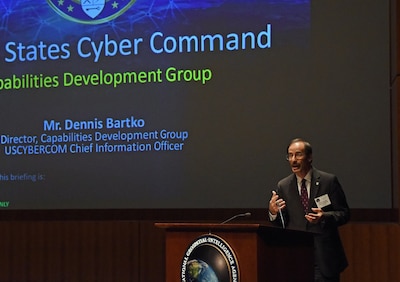FORT GEORGE G. MEADE, Md., Nov. 15, 2017 — At U.S. Cyber
Command’s first-ever industry day, leaders from across the command briefed
nearly 400 members of private industry about the command’s acquisition
priorities at the National Geospatial-Intelligence Agency’s Arthur Lundahl
Conference Center at Fort Belvoir, Virginia, Oct. 27.
Speakers included representatives from acquisitions,
requirements and operations directorates, and the day opened with remarks from
Navy Adm. Michael S. Rogers, Cybercom’s commander.
‘We Have to be Great’
“We have to be lean and agile as we execute our programs,”
Rogers said in a video. “We cannot keep the United States safe into the future,
especially in the rapidly changing domain of cyber, using a firehose approach.
We have to have the precision of a microsurgeon. We can’t just be good, we have
to be great. And, we can’t be great without partnerships.”
He also challenged the attendees to be creative in the
solutions they bring to the table to help defend the nation and stressed that
communication would be the key to success.
Other leaders echoed Rogers’ comments, including Dennis
Bartko, the director of the command’s Capabilities Development Group.
Sharing Information
“Our objective [for industry day] is pretty simple: to share
information with you so we can work together as a team to enable the Cyber
Mission Force. Nothing works in this domain without partnership,” Bartko said.
“I believe that communication is the lifeblood of teamwork, and like Admiral
Rogers said, communication needs to go both ways.”
Bartko also laid out his expectation and vision for how the
command would use its new limited acquisition authority granted by Congress,
which allows Cybercom to execute contract actions up to $75 million per fiscal
year until Sept. 30, 2021, for rapid tool development, IT services and other
capabilities related to cyber operations.
Cybercom will continue to rely on the military departments
and federal agencies to write and execute contracts for the remainder of its
capabilities development budget, Bartko said.
“We’re probably not going toward long-term big projects,” he
noted, which is what people tend to think of defense contracting. “We’re likely
going to leverage a DEVOPS model instead.”
DEVOPS, or development operations, refers to a model of
development popular in the software and technology world that aims to limit the
time between concept and implementation. This allows for increased adaptation
and in-stride modifications.
The director of the command’s resources and capabilities
integration directorate, Army Brig. Gen. Karl Gingrich, said this approach was
driven by Cyber Mission Force requirements.
Operational Tempo to Increase
“The CMF reaching [full operational capability] will drive
resources because our operational tempo will increase,” he said. “We will need
to leverage automation, innovation and a rapid development approach.
Requirements are dynamic so solutions need to be responsive.”
Tony Davis, previously the acting Command Acquisition
Executive at Cybercom, helped the command create the processes and programs
needed to execute its new acquisition authority. While Davis has returned to
U.S. Special Operations Command in Tampa, Florida, he stated he sees a bright
future for the new acquisitions office.
Davis said the cyber acquisitions model requires agility and
flexibility, particularly in prototyping, where products will be delivered “in
weeks or months, not months or years.” The challenge then, he said, is how to
get the capability into the hands of the warfighter to test it.
Davis stressed the need for competition in this space and a
commitment to working with small businesses.
Cybercom currently has small business and competition
advocate functions to ensure the integrity of the competitive process. It also
plans to use part of its acquisition authority to create an unclassified
collaboration venue where businesses and academia can help tackle tough
problems without needing to jump over clearance hurdles, which can often be a
barrier for small businesses and researchers.
Command officials said that ultimately partnership, outreach
and teamwork will make Cybercom more agile and capable in its ability to defend
the nation.








No comments:
Post a Comment